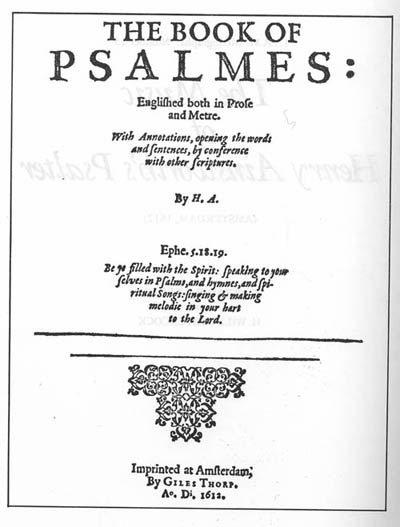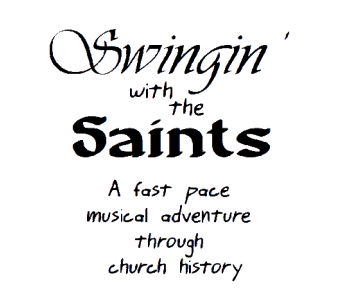The Ainsworth Psalter, 1612. The Bay Psalm Book, 1698. The Grounds and Rules of Music Explained, 1721. The psalms within the book are influenced by the English, Dutch, and French, because Henry Ainsworth was originally from England; he moved to Amsterdam, where French and Dutch reformed churches were prominent. Instruments were not allowed, so a bystander would have only heard voices singing simple melodies. Bunker connects Bradford’s account with the biblical commentary and psalter of the Cambridge-educated English Hebraist Henry Ainsworth, whom the Pilgrims held in high esteem. We know the Mayflower ’s passengers had, in addition to the Ainsworth Psalter, at least two copies of his major work, his Annotations upon the Five Books of Moses.
Anthology of | |
Tunes|Tunebooks and Prefaces |Resources Contact the Editor | About the Editor | Bethel University | |
This anthology. . . contains 50 representative tunes in 33 tunebooks and 7 categories sung by Americans from the period between the arrival of the Pilgrims in 1620 and the mid-19th century. We most often experience the printed tunes through transcriptions; but here you will see these tunes as they appeared in the old tunebooks. Some are printed from beautifully engraved copper plates; others are quite primitive in appearance. Some are printed from wood blocks or typeset while others introduce unusual or innovative notation. Some of the tunebooks have fascinating and lengthy prefaces which give insight into the issues that surrounded Psalm and hymn singing. Spend some time looking at the way the tunes are printed; explore the title pages and read the prefaces. The only way to truly experience this vocal art is to sing it, occasional printing errors and all, with a group of friends. | Related resources by the editor: About this site: |
|
|
|
Ainsworth Psalter Pdf
Composers |
.JPG/1200px-Old_Hundredth_Sternold_%26_Hopkins_(1628).JPG)
- Members of that congregation later joined the Mayflower pilgrims. Although Henry Ainsworth did not accompany them on the journey, they brought with them his Ainsworth Psalter — a metrical psalter which was the first hymnal to be used in New England. It remained in use in some places until the late 19th century.
- Current Issues in Linguistic Theory 314-harry.pdf - Free ebook download as PDF File (.pdf), Text File (.txt) or read book online for free.
Bradbury, William [1][2][3][4][5] | |
Tans'ur, William [1][2] | |
Lowell Mason | The National Psalmist, 1848 |
Transcriptions or Images of Selected Prefaces |

Historical Information Amazing Grace: Some Early Tunes The Hymn Tune Index Olney Hymns (John Newton and William Cowper) Organizations Hymn Society of the United States and Canada |
Mark D. Rhoads, Department of Music, Bethel University, 3900 Bethel Drive, St. Paul, MN 55112 |



Two notable scholars are in the Ainsworth family tree.
Henry Ainsworth was a Puritan clergyman in the 16th century who was also a notable scholar and musician. In addition to several tracts and books, he made a translation of the Old Testament directly from the Hebrew. I was privileged to see a first edition of it in the Parker Library of Corpus Christi College, Cambridge. He was the Teacher (an official post) to a Puritan congregation who fled England for the Netherlands. Members of that congregation later joined the Mayflower pilgrims. Although Henry Ainsworth did not accompany them on the journey, they brought with them his Ainsworth Psalter — a metrical psalter which was the first hymnal to be used in New England. It remained in use in some places until the late 19th century. Wordsworth mentions it in “The Courtship of Miles Standish” - “the well-worn psalm-book of Ainsworth, Printed in Amsterdam, the words and the music together, Rough-hewn, angular notes, like stones in the walls of a churchyard, Darkened and overhung by the running vine of the verses.”
Not one of my direct ancestors, but related, Robert Ainsworth, 1660-1743, was a lexicographer who compiled a famous dictionary of Latin (Ainsworth’s Latin Dictionary, 1736) that was the standard work for at least 150 years and saw 24 authorized editions in England and two in Boston. He was a friend of Charles Wesley, the founder of Methodism, who mentioned their meeting in 1738 in his diary: “I was much moved at the sight of Mr. Ainsworth, a man of great learning, above seventy, who, like old Simeon, was waiting to see the Lord’s salvation, that he might depart in peace. His tears and vehemence and childlike simplicity showed him upon the entrance to the Kingdom of Heaven.”
Ainsworth Psalter Mayflower
- Next: The Ainsworths of Smithills Hall